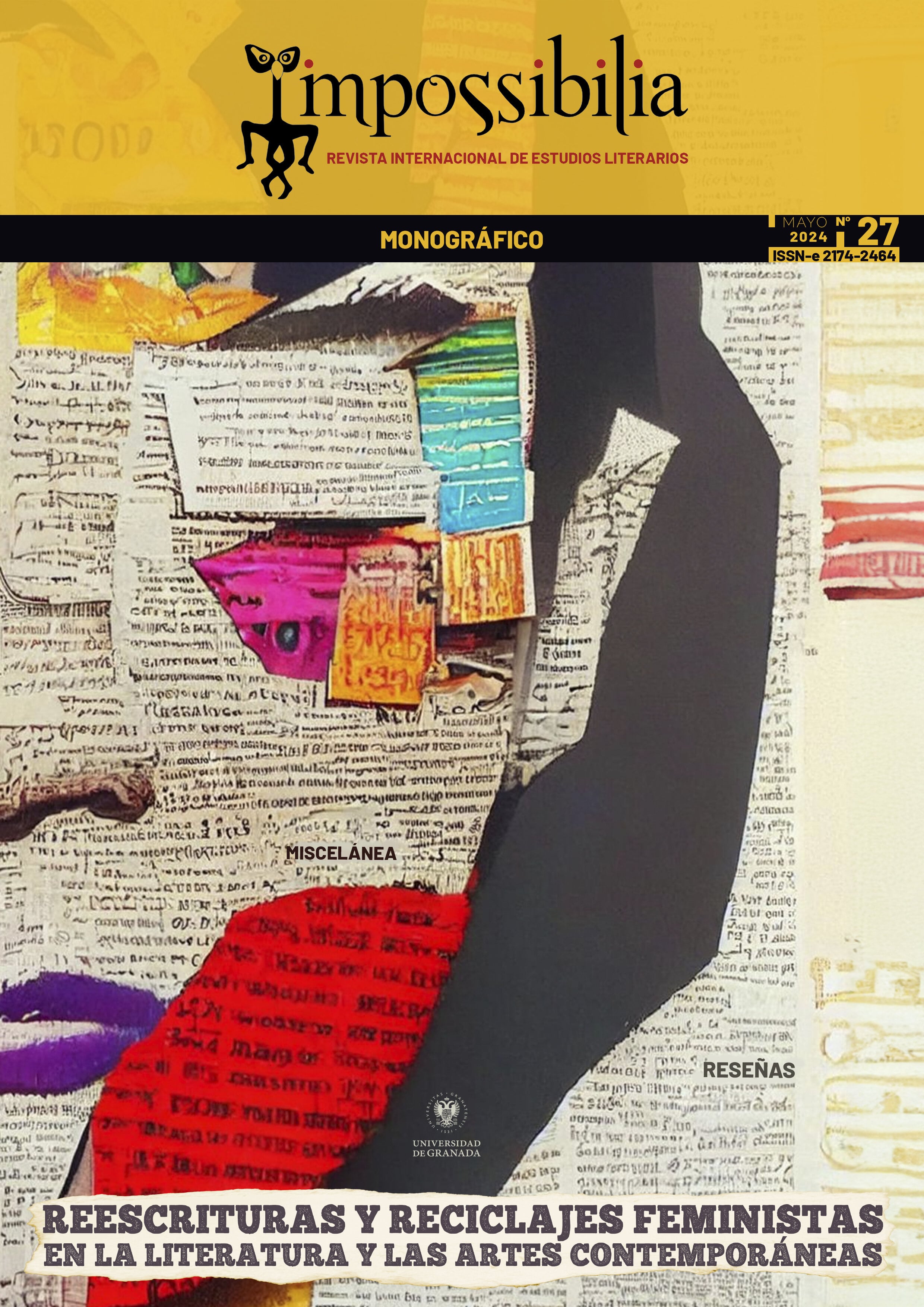¿Víctima, seductora o verdugo? El reciclaje ambiguamente feminista de Caperucita Roja: de Charles Perrault a la cultura pop contemporánea
DOI:
https://doi.org/10.30827/impossibilia.272024.29866Palabras clave:
Caperucita Roja, feminismo, estrategias de reciclaje, empoderamiento, narrativas, ficciónResumen
Caperucita Roja es posiblemente uno de los cuentos de hadas más famosos del mundo. El cuento se ha interpretado tradicionalmente como una experiencia de aprendizaje freudiano (Bettelheim, 1976) y tanto su carácter popular como su simpleza narrativa permitieron que el célebre Umberto Eco lo utilizara como parábola de los límites de la interpretación (Eco, 1994). Este artículo examinará el proceso de reciclaje que ha sufrido el cuento desde Charles Perrault hasta nuestros días, pasando por diferentes medios como el cómic, películas, animes o canciones de finales del siglo XX a comienzos del XXI. Se estudiarán las estrategias que tienen lugar para volver a contar el cuento y reciclarlo sobre todo en la cultura pop (ya sea desde un punto de vista estructural o bajo un nuevo marco conceptual) y sus implicaciones desde la perspectiva de empoderamiento feminista.
Descargas
Citas
BACCHILEGA, Cristina (1997). Postmodern Fairy Tales: Gender and Narrative Strategies. Philadelphia: University of Pennsylvania Press.
BEAUMONT-THOMAS, Ben (2021). Lady Gaga says rape as teenager left her pregnant and caused ‘psychotic break’. The Guardian, 21 may 2021. Available online: https://www.theguardian.com/music/2021/may/21/lady-gaga-rape-teenager-left-her-pregnant-and-caused-psychotic-break
BETTELHEIM, Bruno (1991 [1976]). The Uses of Enchantment: The Meaning and Importance of Fairy Tales. London: Penguin.
BROWNMILLER, Susan (1975). Against Our Will: Men, Women and Rape. New York: Simon and Schuster.
CARTER, Angela (1979). The bloody chamber. London: Gollancz.
DAHL, Roald (1982). Revolting rhymes. London: Jonathan Cape.
DELARUE, Paul & TENEZE, Marie Louise (1976). Le conte populaire français. Paris : Maisonneuve et Larose.
DERRIDA, Jacques (1972). Marges de la philosophie. Paris : Minuit.
DOUGHTY, Amie A. (2006). Folktales Retold: A Critical Overview of Stories Updated for Children. Jefferson, North Carolina: McFarland & Company.
DUNDES, Alan (ed.) (1989). Little Red Riding Hood: A Casebook. Madison: The University of Wisconsin Press.
DWORKIN, Andrea (1974). Woman Hating. New York: E.P. Dutton.
ECO, Umberto (1994). Six walks in the fictional woods. Cambridge: Harvard University Press.
FROMM, Erich (1976 [1951]). The Forgotten Language: An Introduction to the Understanding of Dreams. New York: Fairy Tales, and Myths, Henry Holt & Co.
GAIMAN, Neil (writer) et alii (1989-1996). The Sandman. New York: DC Comics.
GAIMAN, Neil (writer); & VESS, Charles (illustrator) (2010). Instructions. Glasgow: HarperCollins.
GARCÍA-CARCEDO, Pilar (2022). Cenicienta cumple cuatro mil años. Estudio comparativo de los cuentos maravillosos: Princesas activas en las versiones tradicionales. Madrid: Verbum.
GARDNER, Martin (2000). Little Red Riding Hood. Skeptical Inquirer, Notes of a Fringe Watcher, 24(5), 14-16.
GRAY, Richard (2012). The Performance Identities of Lady Gaga: Critical Essays. North Caroline: McFarland & Company.
HAASE, Donald (ed.) (2004). Fairy Tales and Feminism: New Approaches. Michigan, Detroit: Wayne State University Press.
HAYTON, Natalie (2013). Little Red Riding Hood’ in the 21st Century: adaptation, archetypes, and the appropriation of a fairy tale. Doctoral Thesis. Leicester: Montfort University.
JENKINS, Henry (2013). Spreadable media: Creating Value and Meaning in a Networked Culture. New York: NYU Press.
KARR, Jean-Baptiste Alphonse (1849). Les guêpes, january issue.
LIEBERMAN, Marcia. R. (1972). “Some Day My Prince Will Come”: Female Acculturation through the Fairy Tale. College English, 34(3), 383–395.
LURIE, Alison (1970). Fairy Tale Liberation. The New York Review, December 17, 1970 issue.
LYOTARD, Jean-François (1979). La condition postmoderne. Paris: Minuit.
McLUHAN, Marshall (1964). Understanding media: the Extensions of Man. New York: McGraw Hill.
NAPIER, Susan (2005). Anime from Akira to Howl's Moving Castle: Experiencing Japanese Animation. New York: Palgrave Macmillan.
NAPIER, Susan (2006). “'Excuse Me, Who Are You?”: Performance, the Gaze, and the Female in the Works of Kon Satoshi". In BROWN, Steven T (ed.). Cinema Anime: Critical Engagements with Japanese Animation (23-42). New York: Palgrave Macmillan.
ORENSTEIN, Catherine (2002). Little Red Riding Hood Uncloaked. New York: A Member of the Perseus Book Group.
OSHII, Mamoru (1988-2000). Kerberos Panzer Cops. Tokio: Kasakura Shuppansha.
PERRAULT, Charles (2019 [1697]). Contes de ma mère l’Oye. Paris : L’école des loisirs.
PROPP, Vladimir (1969) [1928]. Morphology of the Folktale. Austin: University of Texas Press.
REYNOLDS, Simon (2011). Retromania. New York: Farrar, Straus and Giroux.
ROWE, Karen E. (1979). Feminism and Fairy Tales. Women’s Studies, 6(3), 237-257.
SCHOLES, Robert (1979). Fabulation and metafiction. Chicago: University of Illinois Press.
TEHRANI, Jamshi J. (2013). The Phylogeny of Little Red Riding Hood. PLoS ONE, 8(11), e78871. https://doi.org/10.1371/journal.pone.0078871
TOSCA, Susana (2013). Fairy tale trans-migrations: the case of Little Red Riding Hood. Intersemiose, 4(II). Available online: http://www.neliufpe.com.br/wp-content/uploads/2014/02/11.pdf
ZIPES, Jack (ed.) (1993). The Trials and Tribulations of Little Red Riding Hood. New York: Routledge.
Filmography
Casablanca (dir. Michael Curtiz), 1942.
Illang: the Wolf Brigade (dir. Kim Ji-woon), 2018.
The company of wolves (dir. Neil Jordan), 1984.
Freeway (dir. Matthew Bright), 1996.
Hard Candy (dir. David Slade), 2005.
Hoodwinked! (dir. Cory Edwards), 2005.
Jin-Roh: The Wolf Brigade (dir. Hiroyuki Okiura), 1999.
Rashomon (dir. Akira Kurosawa), 1950.
Red Hot Riding Hood, (dir. Tex Avery), 1943.
Red Riding Hood (dir. Catherine Hardwicke), 2011.
The Red Spectacles (dir. Mamuro Oshii), 1987.
The Sandman (Netflix), 2022.
StrayDog: Kerberos Panzer Cops (dir. Mamuro Oshii), 1991.
The usual suspects (dir. Brian Singer), 1995.
Songs
“LI'L RED RIDING HOOD”, IN LI'L RED RIDING HOOD (SAM THE SHAM & THE PHARAOHS, 1966).
“Monster” in The Fame Monster (Lady Gaga, 2009).
Descargas
Publicado
Cómo citar
Número
Sección
Licencia
Derechos de autor 2024 Impossibilia. Revista Internacional de Estudios Literarios

Esta obra está bajo una licencia internacional Creative Commons Atribución-NoComercial-SinDerivadas 4.0.















